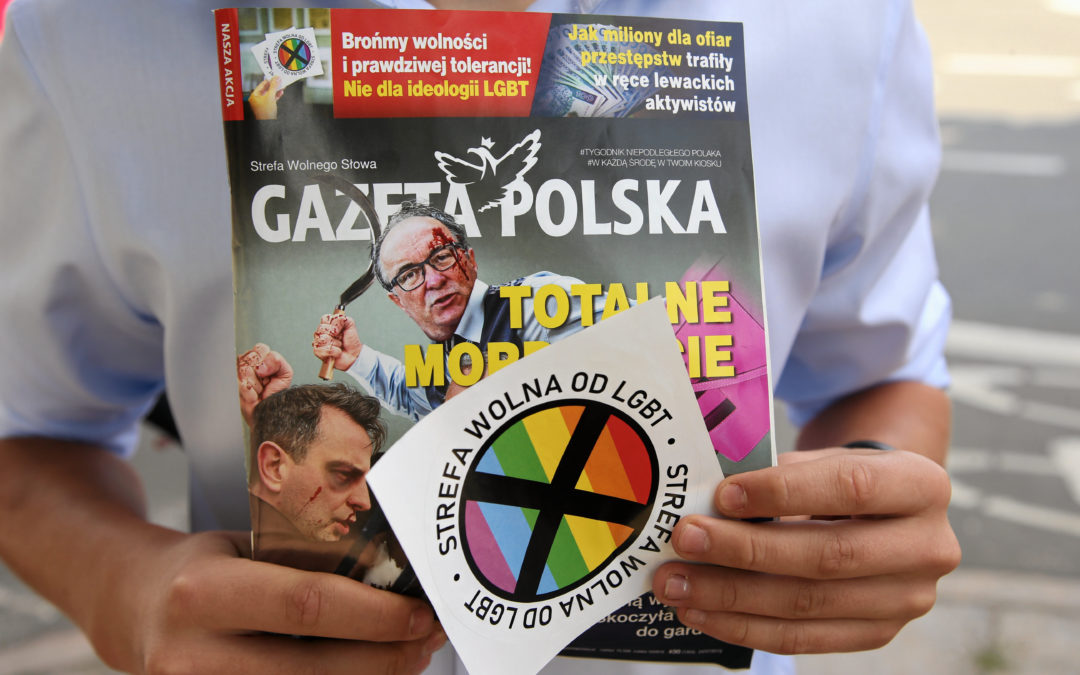The European Commission has written to the heads of five Polish administrative provinces requesting an explanation regarding resolutions passed by local authorities declaring themselves “free from LGBT ideology” or adopting “Charters of Family Rights”.
The Commission wants to ascertain whether such resolutions were discriminatory actions, reports Onet.pl. It has urged the governors of the five provinces: Lublin, Łódź, Małopolska, Podkarpackie, and Świętokrzyskie, to investigate and respond.
In the letter, the Commission reminds the local authorities that the activities of beneficiaries of the European Structural and Investment Funds must be in accordance with European values and may not violate any European laws. Discriminatory actions against any citizens may negatively influence the amount of European funds granted to Poland in the future.
The letter notes that the Commission has been receiving numerous complaints that “some local governments have adopted discriminatory declarations and resolutions targeting LGBT people”.
The letter is based on Article 2 of the European Union Treaty from 2012, which defines the common values of the EU as “respect for human dignity, freedom, democracy, equality, the rule of law and respect for human rights, including the rights of persons belonging to minorities”, OKO.press reports.
Article 2 goes on to state that in all member states of European Union “pluralism, non-discrimination, tolerance, justice, solidarity and equality between women and men prevail”.
Similarly important is Article 7 of the regulations on EU funding from 2013, which states that all beneficiaries of EU funds should aim at combating discrimination based on sex, racial or ethnic origin, religion or belief, disability, age or sexual orientation.
“The letter is the embodiment of anti-discriminatory values as core rules of the European Union,” said Anna Błaszczak-Banasiak from the office of Poland’s Commissioner for Human Rights (RPO), quoted by OKO.press. On Twitter she wrote that Poland will have “access to EU funds only on condition of not discriminating”.
Komisja Europejska pisze do samorządów w sprawie uchwał antyLGBT: dostęp do projektów ze środków UE tylko pod warunkiem niedyskryminacji. Ja wiedziałam, że tak będzie: https://t.co/wRb312uTWM @Adbodnar @ambroziak_a @EwaIvanova @KPH_official @milosc_ @MFIPR_GOV_PL pic.twitter.com/0ql1JaROPT
— A.Błaszczak-Banasiak (@Anna_Blaszczak) June 2, 2020
Błaszczak-Banasiak added that Poland cannot be a legitimate member of this community if it does not obey the rules of equal treatment and discriminates against some of its citizens.
Bartosz Staszewski – the activist leading the initiative to take photographs of fake signs saying “LGBT-free zones” next to the names of towns that had passed discriminatory resolutions – said that “only a firm EU reaction may defend Polish citizens against further discrimination form local governments,” quotes Gazeta.pl.
Komisja EU @EUinPL Do urzędów marszałkowskich, które przyjęły Strefy wolne wpłynęły pisma komisji wzywające do niedyskryminacji przy korzystaniu z funduszy europejskich. Brawo!! #lgbtfreezones pic.twitter.com/dLucBlnRMM
— Bart Staszewski 🏳️🌈🇵🇱 (@BartStaszewski) June 2, 2020
The European Parliament took a stand against Polish “zones free from LGBT ideology” in December last year. MEPs voted in favour of a resolution condemning the discrimination of LGBT people in Poland and urged the Polish government to revoke the discriminatory declarations.
The resolution described these measures as part of “a broader context of attacks against the LGBTI community in Poland, which include growing hate speech by public and elected officials and public media, as well as attacks and bans on Pride marches and actions such as Rainbow Friday”.
The document’s title mentioned Poland’s “LGBTI-free zones”, and the text notes that 80 areas in Poland have declared themselves free from “LGBT ideology” or have adopted “Charters of Family Rights” that “discriminate in particular against single-parent and LGBTI families”.
Map showing (in red) provinces, districts and municipalities whose local governments have declared themselves 'free from LGBT ideology'.
Green = where such resolutions have been rejected
Yellow = where they're bring prepared
Via Kartografia Ekstremalna: https://t.co/Vf4MgfwM0b pic.twitter.com/7P6OByl16p
— Daniel Tilles (@danieltilles1) July 21, 2019
In the last annual “Rainbow Map”, a ranking produced by ILGA-Europe, a Brussels-based NGO that advocates for the rights of LGBT people, Poland was ranked as the EU’s worst offender, taking into account both the legal situation as well as the “social climate”. In last year’s index, Poland was ranked second-worst, but has since fallen to last place.
Main image credit: Agencja Gazeta/Cezary Aszkiełowicz

Agnieszka Wądołowska is deputy editor-in-chief of Notes from Poland. She is a member of the European Press Prize’s preparatory committee. She was 2022 Fellow at the Entrepreneurial Journalism Creators Program at City University of New York. In 2024, she graduated from the Advanced Leadership Programme for Top Talents at the Center for Leadership. She has previously contributed to Gazeta Wyborcza, Wysokie Obcasy and Duży Format.




















